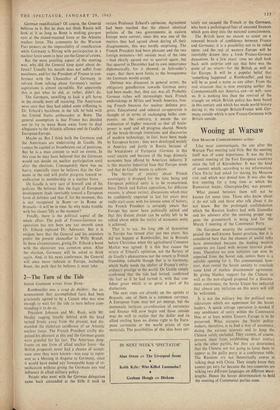2—The Turn of the Tide
SARAH GAINHAM writes from Bonn:
Rambouillet was a coup de thOdtre: the an- nouncement that accomplished facts had been graciously agreed to by a Canute who was wise enough to wait for the tide to turn before com- manding it to do so.
President Johnson and Mr. Rusk, with Mr. Healey tagging loyally behind with his head turned firmly away from the present, had dis- mantled the elaborate cardhouse of an Atlantic nuclear force. The French President civilly dis- guised his pleasure at this and the German guests were grateful for his tact. The American deep- freeze on any form of allied nuclear force—the British proposals never had a chance of accept- ance once they were known—was easy to repre- sent as a blessing in disguise to Germany, since it would have ended any foreseeable hope of re- unification without giving the Germans any real influence in allied military policy.
People who went with the German delegation came back astounded at the little it took to restore Professor Erhard's optimism. Agreement had been reached that the almost identical policies of the two governments in eastern Europe were correct; since this was one of the matters they had agreed about during all their disagreements, this was hardly surprising. The French President had been pleasant and the two foreign, ministers—left outside most of the time —had clearly agreed not to quarrel again; but that quarrel in December had its own importance diplomatically, for it showed, in Schroeder's anger, that there were limits to the brusqueness the Germans would accept.
Defence was discussed in general terms; the obligatory genuflection towards German unity had been made; that, they say, was all. Probably German riches will increasingly back French undertakings in Africa and South America, free- ing French finances for nuclear defence pro- gress. Educational and cultural co-operation is thought of in terms of exchanging ballet com- panies; on the contrary, it means the co- ordination of higher research so that all brain- power is used and all progress shared. Nearly all the break-through inventions and discoveries of modern technology, in fact, have been made by European brains: they were developed mainly in America and partly in Russia because of the breakdown of Eurbpean (German in this case) society and because of the huge domestic economic base offered by American industry. It is this massive industrial base that Europe needs and that de Gaulle means to achieve.
The barrier of anxiety about French sovereignty is dropped for the time being and European political unity is to be re-examined. Since Dutch and Italian opposition, for different reasons, is almost extinct, discussions which may be confidently expected to last for years may really start soon; with his intense sense of history, the French President is certainly aware that Europe has never been politically united and that this distant dream can be safely left to be talked about while the reality of economic unity is achieved.
That is to say, the long ebb of dynamism in Europe has turned after just two years; this did not happen at Rambouillet, but in Brussels before Christmas when the agricultural Common Market was agreed. It is this that causes the return of Erhard's optimism, not the flattery of de Gaulle's pleasantness nor the return to French friendship, valuable though that is to Germany, which badly needs the shelter of France's extra- ordinary prestige in the world. De Gaulle simply confirmed that the tide had turned, confirmed the fact as if he had turned it, with that con- fident grace which is so great a part of his distinction.
The next steps are already on the agenda at Brussels; one of them is a common currency.
A European franc may not yet emerge, but the immensely intricate co-ordination of currencies and finance will now begin and those outside may do well to realise that the dollar and its allied sterling have no divine right to fix Euro- pean currencies or the world prices of raw materials. The possibilities of this idea have cer-
tainly not escaped the French or the Germans, who have a pathological fear of unsound finances which goes deep into the national consciousness.
The British have no reason to count on a renewed breach of confidence between France and Germany; it is a possibility not to be relied upon, and the rest of western Europe will be inevitably drawn into a fresh Franco-German dynamism. In a few years' time we shall look back with surprise and say that here was the point of no return—for the British as well as for Europe. It will be a popular belief that 'something happened' at Rambouillet; and that will be as good a name as any other. From the real situation that is now emerging neither the Commonwealth nor America can—or will—save us. It is nothing less than the reversal of the triangle on which British policy has been based in this century and which has made world history during it; the triangle Britain-France with Ger- many outside which is now France-Germany with Britain outside.


































 Previous page
Previous page